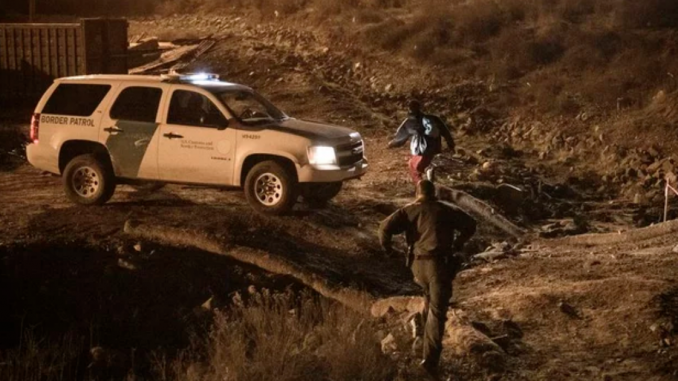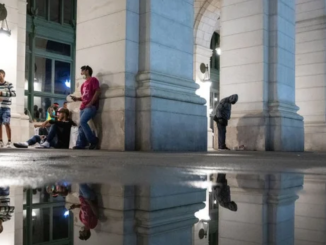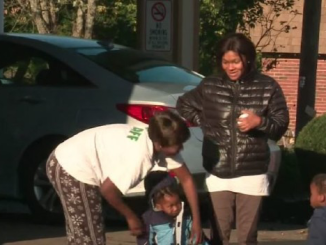
Border Patrol agents have long known illegal immigrants sneaking across the boundary sometimes lie about their ages, claiming to be juveniles to try to get lenient treatment. Many get away with it, and those who do get flagged are usually siphoned over to the adult population.
The Biden administration this week changed that calculus by announcing charges against four adults who jumped the border in the past month and claimed to be children, then had agents puncture those stories.
“It’s about time,” said Jessica Vaughan, policy studies director at the Center for Immigration Studies. “It’s the right thing to do, so that word gets around.”
Osmin Trochez-Miranda was apprehended by Border Patrol agents near Roma, Texas, on April 28 and claimed to be a juvenile. During processing, intelligence agents say, they became suspicious of the document he was using to back up his age.
Under questioning the next day, court documents say, he admitted he was 24 — seven years older than allowed. He admitted that he lied about his birth date and that his identity document was bogus.
Arrested under similar circumstances were Jose Alfredo Sandoval-Hernandez and Sergio Galindo Chun-Cucul, who admitted they were 23, and Fernando Antonio Flores-Galves, who is 19, agents told the court. Mr. Chun-Cucul is Guatemalan, and the other three are Honduran.
All of the men are charged with one count of making a false statement to the government.
That is the same crime special counsel Robert Mueller deployed in his probe of Russian meddling in the 2016 presidential election. It is punishable by up to five years in prison.
The dangers are more than just gaming the system.
MS-13 and other international street gangs with heavy immigrant membership use the juvenile system to increase their numbers, law enforcement officials tell The Washington Times.
One former official said the gangs send members and have them lie about their age, pretending to be juveniles. They are then sent to migrant shelters, which hold a pool of potential recruits, almost all of whom are soon released into American communities.
“MS-13 knew full well what to do,” the former official told The Times.
Court files showed no indication that the four illegal immigrants charged with lying had gang ties.
Instead, it appeared they were looking for a shortcut to be released into the community rather than being deported, agents told the court.
In the final months of the Trump administration, they would have been quickly pushed back into Mexico, even as juveniles, under a COVID-19 pandemic health emergency order.
The Biden administration reversed that policy for children, saying it was cruel to send unaccompanied alien children, or UACs, as they’re known in governmentspeak, back across the border. Instead, they are now processed and released as quickly as possible into the U.S. to join relatives or other sponsors.
That lenient treatment has spurred a surge of children rushing to take advantage — and, agents say, a surge of adults lying.
That is related to the other phenomenon of people traveling together claiming to be parents and children, hoping to take advantage of relaxed enforcement policies toward families. In those cases, some adults try to claim children who don’t belong to them. In other instances, they are related but the son or daughter is not a juvenile.
Prosecutions have been lodged in those fake family situations, but cases against fake UACs are rare, if not unprecedented.
The new cases were filed in the Southern District of Texas. A spokeswoman said authorities couldn’t say how often those kinds of cases have been brought before because the statute used covers a wide range of cases.
The four cases barely scratch the surface of the total, analysts said.
Over the past three months, the Border Patrol has logged nearly 45,000 UACs. The previous three-month record was about 29,000, set in 2019. Before that, the high point was about 28,900 in summer 2014.
One indication of the growing fraud is the higher number of people claiming to be 15 to 17 years old. For most of the past decade, the rate hovered at or below 72% of the total juvenile population. But as of March 31, 78% of the UAC population in the custody of the Department of Health and Human Services was 15 to 17.
Testifying to Congress on Wednesday, acting Customs and Border Protection Commissioner Troy Miller said unless agents can disprove the migrant’s age claim, their policy is to give them the benefit of the doubt. That means adults are placed with children.
“It’s a difficult process, to be perfectly honest with you,” Mr. Miller said.
He said agents have built experience in how to sniff out questionable cases. They investigate by prodding the migrant and those the migrant may have been traveling with for more information, and in some cases will run fingerprint checks to try to home in on identities.
But he acknowledged that cases slip through.
“At the end of the day, if we’re unable to determine an age, we’re going to err on the side of being a juvenile,” he said.
Ms. Vaughan at the Center for Immigration Studies said if the government wanted to make a more significant statement, it should not just catch fake juveniles at the border, but also go after those who make it through the processing and are released to sponsors and later are discovered to have been adults all along.
“There are plenty of cases, and the resettlement contractors and local officials could report them, but [Health and Human Services] won’t accept responsibility or work with [the Department of Homeland Security] on it,” she said. “The government seems to want to wash their hands of these cases as soon as they are released to the sponsors, real or fake.”
*story by The Washington Times


